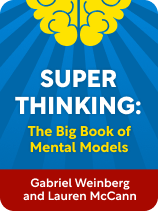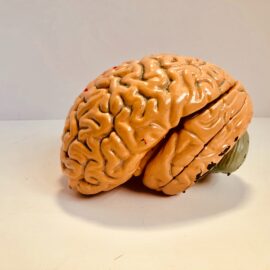

This article is an excerpt from the Shortform book guide to "Super Thinking: The Big Book of Mental Models" by Gabriel Weinberg and Lauren McCann. Shortform has the world's best summaries and analyses of books you should be reading.
Like this article? Sign up for a free trial here.
What is “super thinking”? How does super thinking facilitate learning and decision-making?
According to Gabriel Weinberg and Lauren McCann, super thinking is the ability to accurately understand the world. Further, they claim that you can develop this ability by learning how to think in terms of mental models.
Keep reading to learn what mental models are, where they come from, and why they’re valuable in decision-making.
What Are Mental Models?
According to Gabriel Weinberg and Lauren McCann, the authors of Super Thinking, mental models are concepts and patterns that help us understand various situations across distinct topics. For instance, the mental model of supply and demand dictates that the relation between supply and demand determines prices: If supply exceeds demand, the price decreases, and if demand exceeds supply, the price increases.
(Shortform note: In The Great Mental Models Volume 1, Shane Parrish and Rhiannon Beaubien describe mental models as representations of how things work. Weinberg and McCann, however, go further, using the term “mental models” to describe a wide array of concepts beyond mere representations of how things work. For example, they even refer to generic phenomena such as multitasking and organizational culture as mental models. For clarity, we’ve italicized the mental models included in this guide.)
Super Models and Super Thinking
Although mental models arise from a particular context, some mental models are useful outside of their original contexts. Weinberg and McCann call these super models, which are the focus of Super Thinking. By recognizing recurring patterns across disparate fields, super models provide a shortcut to superior reasoning.
For example, consider the concept of critical mass. In physics, critical mass refers to the mass of an atom at which a nuclear chain reaction becomes possible. Once an atom’s critical mass is reached, a chain reaction can occur, causing an explosion. Similarly, businesses reach critical mass when their customer base reaches a certain size, leading to explosive growth of the customer base. Dating apps, for instance, reach critical mass once they have enough members to establish a viable dating pool, because many new members join only after a sufficiently large dating pool exists.
Such models are useful, Weinberg and McCann argue, because they help you achieve super thinking—they provide you the means to more accurately understand the world and its underlying mechanisms. Super models eliminate misconceptions and inefficiencies in our reasoning, instead offering reliable patterns and heuristics to analyze various situations.
(Shortform note: In The Great Mental Models Volume 1, Shane Parrish and Rhiannon Beaubien argue that mental models can serve an even broader purpose: cultivating wisdom. Though it’s unclear what constitutes wisdom, Parrish and Beaubien claim that it involves the ability to see creative solutions to various problems. In this view, wisdom is practical–it helps us know what to do in the face of unexpected challenges.)
By improving our ability to evaluate information, super models improve our decision-making. When used in concert, disparate super models form a set of tools to inform our decisions in virtually any situation.

———End of Preview———
Like what you just read? Read the rest of the world's best book summary and analysis of Gabriel Weinberg and Lauren McCann's "Super Thinking: The Big Book of Mental Models" at Shortform.
Here's what you'll find in our full Super Thinking: The Big Book of Mental Models summary:
- How to elevate your everyday reasoning and decision-making skills
- Why you shouldn't rely on intuition when making decisions
- How to deter you opposition from engaging in conflict






